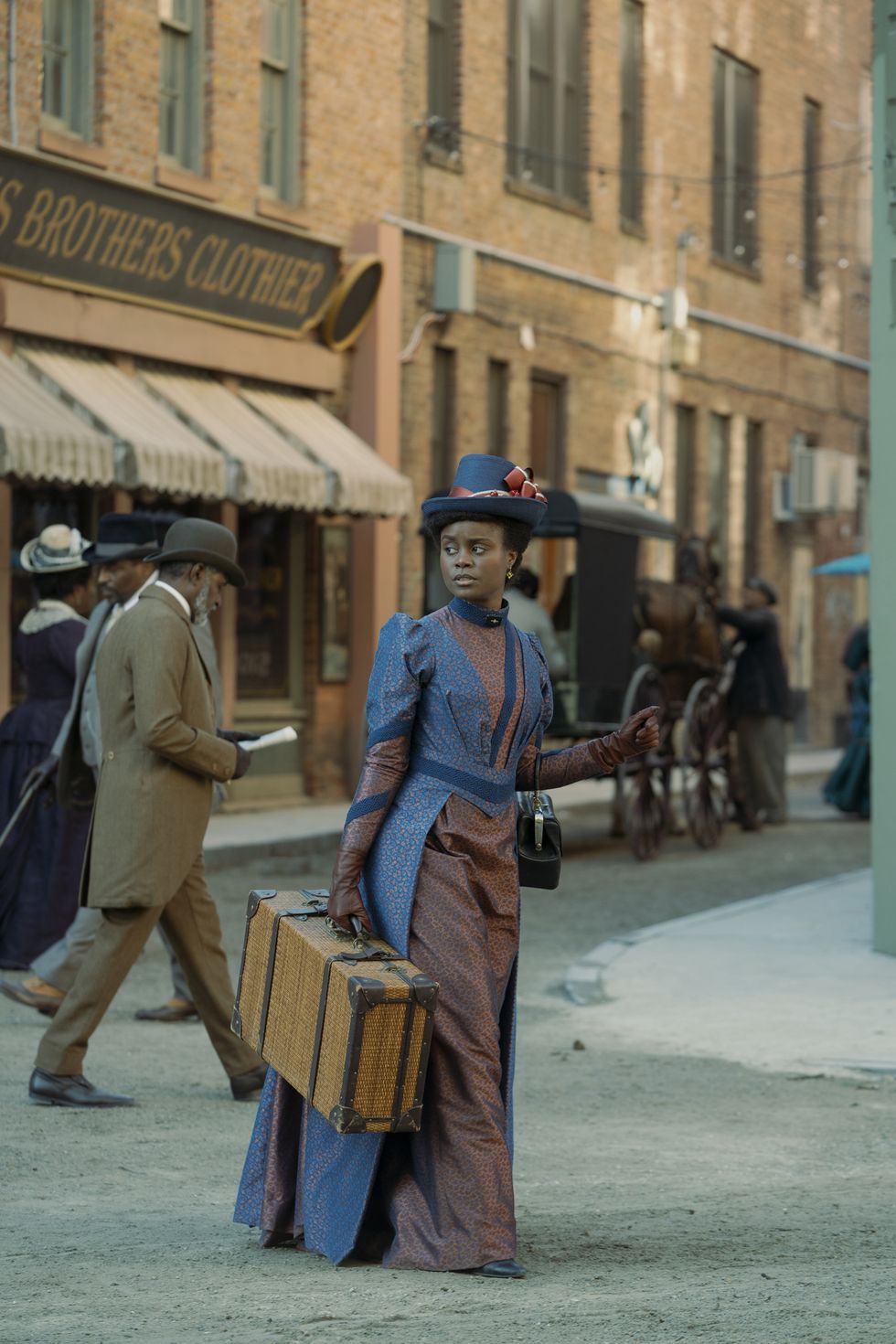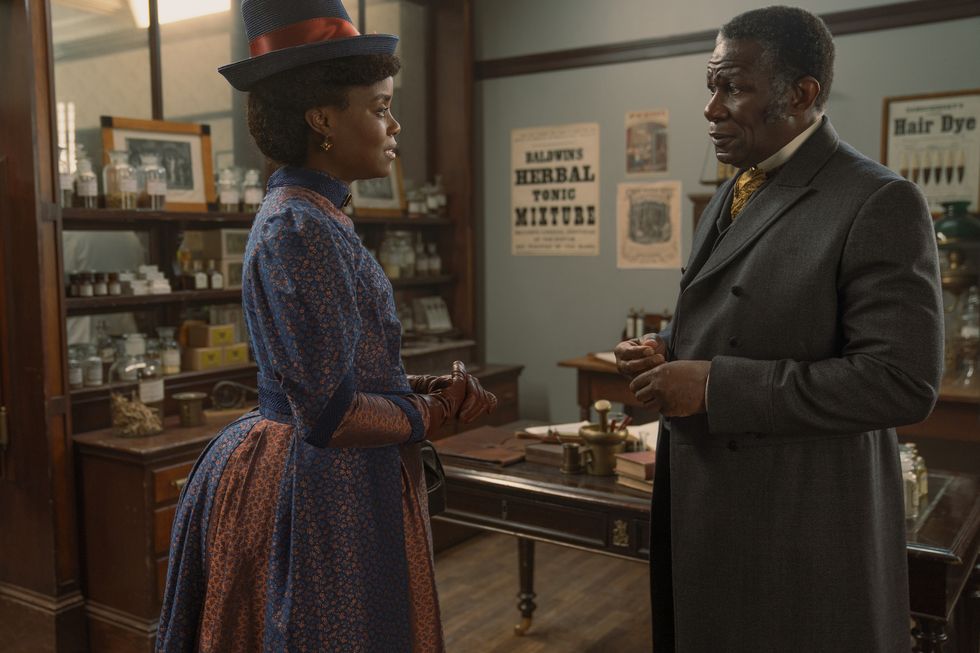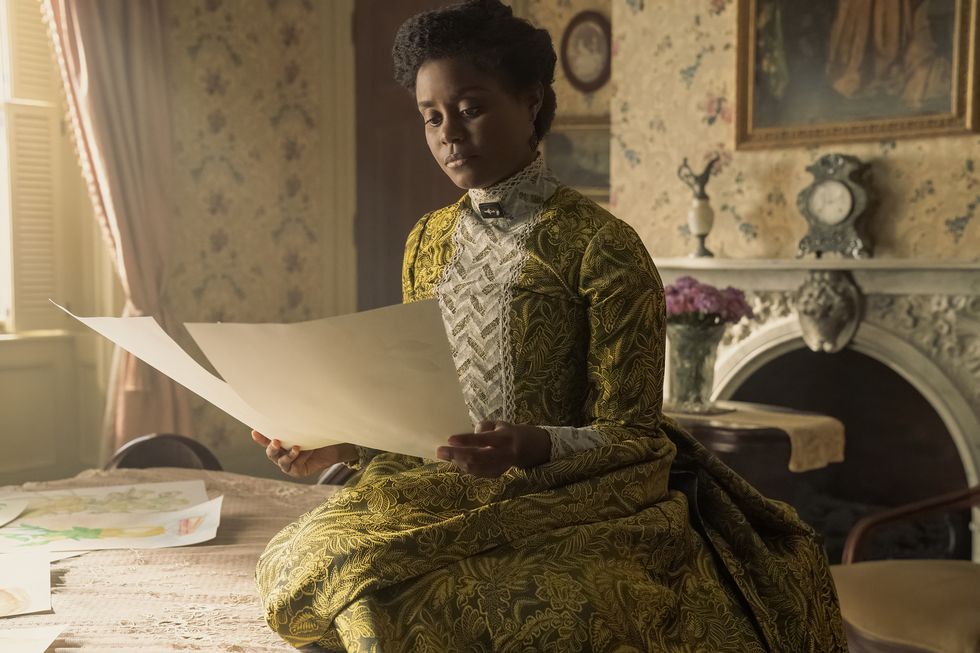The Gilded Age’s Peggy Is a Look Into the Historic Black Elite
In ELLE.com’s recurring feature Character Study, we ask the creators behind our favorite shows to go deep about what went into creating their memorable characters: the original idea behind them, how they were tailored to the actor, and elements of them we might not see on the screen.
When Julian Fellowes and Sonja Warfield set out to follow Downton Abbey up with a New York-set spinoff taking place in 1882, they knew they wanted to include the perspective of a young Black woman, whose life and perspective would bring something often missing from period pieces. Peggy, played by Broadway star, Denée Benton, left her family in Brooklyn after a terrible loss and lives with a wealthy Manhattan family while she pursues a career in writing. In season 2, we see more of Peggy’s ambitions as she works for the The New York Globe, a real-life Black newspaper that opened in 1887, and travels to the South to write about the Tuskegee Institute, a Historically Black University that was founded in 1881.
It was important to Warfield to give a Black character in a period piece a storyline outside of slavery. “What I really like about Peggy is that she has options and few women back then had options, let alone Black women,” she says. “Peggy is not taking anything for granted and she was married and in love but she’s not just going to rest on her laurels. She is going to live out her dreams. And she gets to dream.”
What drew you to Peggy?
Julian Fellowes created the show and what I loved was that he wanted to feature the Black elite. The show takes place 15-ish years post-Civil War. Historically, in television and film, when we watch movies or TV shows in relation to the Civil War and it’s focused on Black characters, it’s all about their story in relation to enslavement. Stories that haven’t been told are the stories about the Black elite, are the stories about people who have jobs, who have degrees, who were free. Who were born as slaves and then went on to have careers.
That’s what really drew me to it. Then in feeling Peggy out, she’s got a complicated relationship with her parents that I really liked. I think that’s something that’s universal, that everyone can relate to, no matter what age, class, race, gender. It was just really important for me that Peggy had agency and she had a voice and that she didn’t pull back. She’s educated. I just wanted her to have a full life.
What qualities do you think are most significant in Peggy?
In season one, she’s guarded with Marian [her friend, whose family she lives with, played by Louisa Jacobson] because she doesn’t know her. She’s not going to be vulnerable yet. She’s eager to go out on her own and forge her own path and her own identity. We don’t know until the end of season one that she’s running away from something, that she had this whole other life. She’s guarded with the servants in the Brook house and I think she is guarded for a really good cause because she knew who Armstrong [a maid, who is cruel and resentful towards Peggy] was from the beginning.
Peggy’s mother was so scared about her traveling to Alabama, while Peggy wasn’t. I wondered whether the generational changes or her being from New York had guarded her from seeing some of those things.
That specific scene was really inspired by my dad. He’s almost 81 and about the same age that Emmett Till would have been had he not been murdered. Really emblazoned on my brain is the Emmett Till story that my dad told me from a very young age.
I remember my dad telling me stories about how if they took a road trip to the South, from Ohio to Tennessee, they would have to bring their own gasoline because they couldn’t even stop at a gas station. Of course they had to bring their own food.
When my dad was a young boy his father took him on a trip to the South and his mother gave her husband my grandfather the same sort of warning that Dorothy gave to Peggy, which is essentially, “Don’t let this child out of your sight, it’s a different world down there.” That was just seared into my brain.
Audra [McDonald, who plays Peggy’s mom] and Denée, they’re stellar and so amazing. Audra brought that scene to life in a way that was just palpable. You could feel the fear in her heart. Listen, I’m a mother of a Black son and I have had many conversations with him. I’ve had to take a stand for him. It’s that maternal instinct but it goes up a notch because you have a Black child.
Did you reconfigure anything about the character when Denée was cast, or did you base anything on her?
What I think happens on any show is that moving from season one to season two the actor embodies their character and they find depth. These actors, we are just beyond blessed with all of them. They find nuances and levels and depth that as a writer I couldn’t even find. So when we see that, whether we’re on set or watching the dailies, that informs my writing.
What do you want viewers to take away from the character of Peggy?
Listen, it wouldn’t be drama if she didn’t go through a lot and have a lot of baggage, yet despite all of that she does center herself, which is not even what a lot of women today will do. She sticks up for herself, she takes a stand and she fights for what she wants and what she believes in and she takes risks, professionally and personally.
This interview was edited and condensed for clarity.

Features Editor
Adrienne Gaffney is the features editor at ELLE and previously worked at WSJ Magazine and Vanity Fair.





